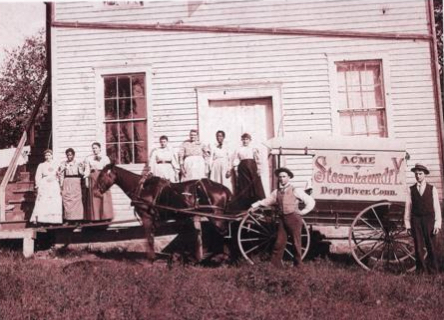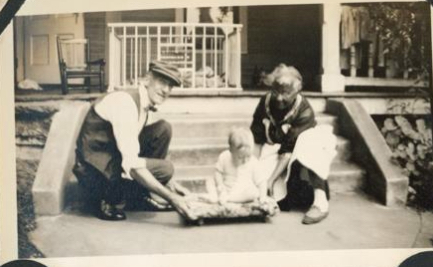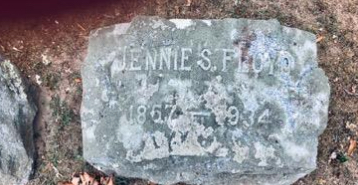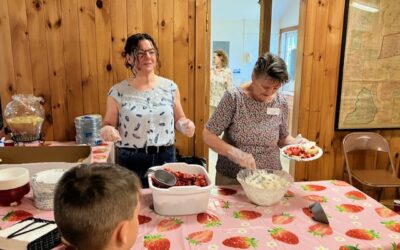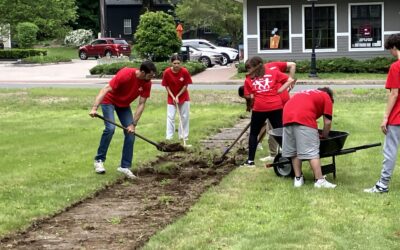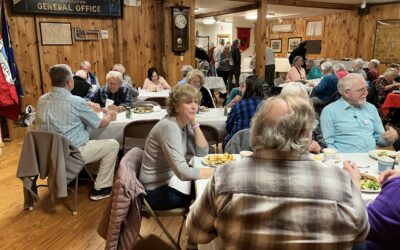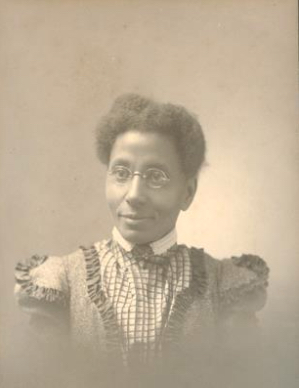 Jennie Smith Floyd was one of Deep River’s most respectable and reliable citizens, a tireless worker for her adopted family, for their businesses, and for the Baptist Church. In those respects, her life was an open book, but little is known about her life-book’s open before she arrived in Deep River on July 28, 1869, an event she noted several times in her diaries: “I came to Mr. Smith July 28th 1869 and I remain here today September 25th 1885 and the Lord have been very good to me.”
Jennie Smith Floyd was one of Deep River’s most respectable and reliable citizens, a tireless worker for her adopted family, for their businesses, and for the Baptist Church. In those respects, her life was an open book, but little is known about her life-book’s open before she arrived in Deep River on July 28, 1869, an event she noted several times in her diaries: “I came to Mr. Smith July 28th 1869 and I remain here today September 25th 1885 and the Lord have been very good to me.”
From what we can glean from census records and her diaries, Jennie was one of the African Americans who came North for opportunity after the Civil War. According to federal censuses from multiple decades, she was born in Florida, but her death certificate states that she was born in Beaufort, South Carolina on October 22, 1857. Somewhat cryptic references in her diaries indicate that she had a brother and possibly a nephew in Beaufort. It is possible that Jennie’s family arrived in Beaufort from Florida to escape slavery during the Civil War and to take refuge at what became known as the Port Royal Experiment, founded by Lincoln’s Secretary of the Treasury Salmon Chase when Jennie was a small child in the early 1860s. Those escaping from slavery worked, for wages, on cotton plantations and went to school at night. Northern doctors and teachers arrived in Port Royal to found hospitals and schools. After the Emancipation Proclamation in 1863, many of the Port Royal African Americans received land that was formerly owned by enslavers. It is possible that Jennie’s family was part of the Port Royal Experiment and that Jennie herself possibly learned to read and write at one of the Port Royal schools even before she arrived in Deep River in 1869 at the age of eleven.
In Deep River, Jennie joined the family of Joseph and Emily Smith on Elm Street. Census records through 1930 list Jennie as a “servant” or “housekeeper,” but she was much more than that. Jennie was about a decade or more older than the Smith’s five children (Allan, Robert, Emma, Louis, and Wilbur), so she was often their minder and playmate. She was a prodigious worker in the Smith household, taking pride in her thorough cleaning, but she was also an exceptionally talented and prolific baker and cook. She had her own place in Deep River’s social life and her own friends.
Here is an entry from her diary from January 1880 when she was twenty-two years old:
I think it has been a lovely day to day I made three Pumpkin pies two cranberry pies two apple pies two loaves of brown bread and two of wheat and I took the close of the fraim and swept the chitching and wash dishes and went upstairs and look at some of my things and came down and fill the lamps and set the tables and milk the cow and eat my supper and clear off the table and wash the dishes and then I had a time trying to fold my shawl stylish but I mad apoor work of it Emma and I went down to Captain Edward Southworth this evening to see Mrs. Stanard and I saw Mrs. Parker and Revs and Kirt and Captain Ed and we meet Uncle Gid and his little granddaughter and he said good evening and we said good evening, sir
Six of Jennie’s recipes appeared in the Baptist Church’s Ladies’ Aide Society’s cookbook, The New Deep River Favorite, in 1927, including this one:
Prune and Apricot Pie- –
2 cups prunes, 1 cup apricots, 1½ cups sugar.
Stew prunes and apricots until tender; remove pits; place in bowl and add butter size of a walnut, the sugar, 2 tablespoons flour, 1 cup liquid in which fruit was stewed. This makes two pies.
Miss Jennie Floyd.
Pie Crust-
2 cups flour, 1 cup shortening, 1 teaspoonful baking powder, a pinch of salt. Mix with as little cold water as possible.
Miss Jennie Floyd
When the Smiths founded the Acme Steam Laundry in the late nineteenth century, Jennie worked there (second from the left in photo), sometimes listing washing figures in her diaries in the early twentieth century.
In her elder years, Jennie helped care for Louis Smith’s toddler son, Louis Smith, Jr.
Although Jennie was a hard worker for and with the Smith family, her relationship to them was much more than that of an employee. She was also a valued member of the Smith family, participating in meals, celebrations, excursions, picnics, and sleighing. In her diaries, she proudly lists the Christmas and birthday gifts she received from members of the Smith family and other friends in Deep River. When Mr. Smith brough treats home from his journeys, Jennie received hers along with the Smith children. She regularly attended Sunday School at the Baptist Church and sometimes wrote out her lessons and bible texts in her diaries. Her position as a member of the Smith family is indicated by her adoption of the name “Jennie Smith Floyd.” She never married and resided with the Smiths for the rest of her life. She is buried in Fountain Hill Cemetery in a row of Smiths with a headstone identical to those of the other Smiths. She was heroic in her steadfast determination to make a life for herself in Deep River with family and friends and her own valued place in the community as a worker and citizen.

